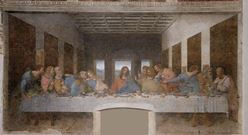[This is part three of a deeper study of the article 7 Reasons Christ is King. To get better context and a link to the other parts, you can click there and read it first.]
His Excellence of Character
The dignity of our Lord doesn’t depend on the fact that he created the world or even inherited it. He is the reflection of God. There was once time when there was no creation, but there has never been a time when God had no glory. It is that intangible essence of God that would have been hard to grasp if there had never been a Christ.
The Hebrews writer attempts to capture that essence through the words we have translated as radiance or effulgence. (Hebrews 1:3) The idea is that Christ shines forth like a brilliant light – certainly this is the inspiration of the many painters through time that rendered Jesus in the middle of light. The audience of the letter was sure to remember how Moses’ face shone after being in the presence of God. Those present at the transfiguration of Christ must have witnessed something similar.
The Image of God
The Son of God bore the exact image of his father. How much extra credit do we give the sons of famous men when they strongly favor their fathers? Something about the genetic similarities causes us to expect so much more from them. How much more then would that apply to image of God?
When the writer said that Christ was the “imprint of His nature,” he was communicating something along the lines of the die that strikes a coin or a branding iron making its owner’s exact mark. Christ said in John 14:9, “he that has seen me has seen the Father.” Paul said we were redeemed by the blood of the very image and first born of God. (Colossians 1:14-15)
Imagine God being available to look at. His hand is held out to hold ours. What if we could look into his eyes and see the love he has for us?
How would God feel if, after all that before us, we rejected him?
That is the emotion that the Hebrew writer was appealing to.
Part 4: The Sustaining Force
Continue reading...
[This is part two of a deeper study of the article 7 Reasons Christ is King. To get better context and a link to the other parts, you can click there and read it first.]
Hebrews says that through Christ, God created the world. (Hebrews 1:2) This credential of Christ is a human right that has never been challenged in the history of man. Whatever one creates is his, by law, by courtesy, and common sense. That said, we can prove Christ as the creator very easily.
- In Colossians 1:16-17 we see that Paul fully understood Christ to be God. In these verses he says that Christ is the Creator of the universe, he was the sole end of his own work, he was prior to all creation, and he is the preserver of all things.
- John 1:3 credits Christ with creation. Nothing is possible except through him.
- Genesis 1:26 says that man was made in “our” image. There was an understanding of the existence of the Godhead even from the beginning.
- John 17:5 records Jesus remembering the glory he felt with God before the beginning.
As Creator, his authority is absolute. Those who turn away from him, like those Hebrews the letter is written to, are turning away from the only one who offers salvation.
Part 3: God in the Flesh
Continue reading...
[This is part one of a deeper study of the article 7 Reasons Christ is King. To get better context, you can click there and read it first.]
The Hebrews writer begins the letter by establishing Christ as the King of kings. Seven reasons are listed verifying his authority,(Hebrews 1:2-3) not over just earthly things but of heaven, the universe – all things. These are listed from lowest to highest, starting with the idea of his being a son, and appointed as the heir.
Family fortunes have always passed through the bloodlines just like legal authority in world’s kingdoms. The only begotten son of God is therefore his rightful heir. The writer no doubt had these verses in mind as he labeled Christ the heir of all things:
- Psalm 2: 8 – … I will make the nations your heritage …
- Zechariah 9:9-10 – … And His dominion will be from sea to sea, And from the River to the ends of the earth.
- Hebrews 1:5 – You are my Son, today I have begotten you (Points back to Psalm 2:7. Paul quotes it in Acts 13:33)
- Hebrews 1:5 – I will be to him a father, and he shall be to me a son (2 Samuel 7:14 – The seed that was promised to David was not Solomon but Jesus Christ)
Since the Jews have denied Christ’s Sonship from the beginning, these strong proofs from the old Law were meant to show them (even remind them) that the idea of a Son of God is not a new idea.
Part 2: The Creator of All Things
Continue reading...
A Quick Note
The goal for this blog on a typical day is to write a little about what occurs to me during my daily reading. For the rest of the year however, I am going to concentrate on preparing for my Bible class on Hebrews that I am going to be teaching for the winter quarter. I will continue to record what I am reading each day, but the blog posts will not necessarily be related.
There is already a link to The Lists of Hebrews above which will serve as the landing page. It contains links to the articles that will serve as the base material for each class. It will remain fluid for the quarter so feel free to check back often.
The Credentials of Christ
Hebrews doesn’t contain much of an introduction in the traditional sense. We don’t know who wrote it, we just see that the writer begins immediately discussing what I call the “credentials of Christ.” The blog post 7 Reasons Christ is King contains the source material to begin the discussion. If we accept that Christ is all the things contained in Hebrews 1:1-4, then we can probably more easily make changes in our lives that conform to the commandments in the Bible.
If the Jews that converted to Christianity needed to be reminded of the reasons that Christ was the Messiah back then, we probably need it even more so today. How is it that today we have alternative plans of salvation, modes of worship, and even thoughts about the origin of all creation?
Because we forget that Christ’s way is the best way!
Daily Bible reading for November 25
Psalm 116
2 Kings 23:31-24:17
Isaiah 17-18
John 16:16-33
Continue reading...
Peter said to him, “Lord, why can I not follow you now? I will lay down my life for you.” – John 13:37

Last Supper – 1495 – Leonardo da Vinci (1452–1519)
Just saying you are willing to do something isn’t quite the same as actually following through is it? Peter thought he was ready, but when the time came to own Jesus, he denied him three times. He would not understand until later what he was signing up for, and just how much he needed God’s involvement.
When the time comes to defend God – when it is time to confess Jesus in a difficult situation, no amount of good-will or sincerity will get us through it without God. Like the old hymn goes – without him I could do nothing.
Peter and the others soon had the advantage of becoming apostles in Acts 2. All except John eventually had to demonstrate the courage required to die for God. Where does that leave us? How do we tap into God’s power?
- We spend time in prayer
- We spend time with his word
- We worship him
- We teach others about him
If we’re being honest with ourselves, we have no idea how we will react the next time we have the opportunity to represent Christ. If we don’t want to deny him like Peter did, we should be getting prepared.
Daily Bible reading for November 21
Psalm 112
2 Kings 20
Isaiah 9:8-10:34
John 13
Continue reading...








November 28, 2013
2 Comments